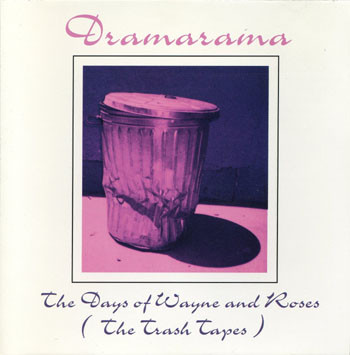
“Everything Is Broken” (1989) – Bob Dylan * Written by Bob Dylan * 45: “Everything Is Broken” / “Death Is Not the End” * LP: Oh Mercy * Produced by Daniel Lanois * Label: Columbia
an ever growing collection of short commentary on memorable tracks

“Everything Is Broken” (1989) – Bob Dylan * Written by Bob Dylan * 45: “Everything Is Broken” / “Death Is Not the End” * LP: Oh Mercy * Produced by Daniel Lanois * Label: Columbia
 “Death Defying” (1985) – Hoodoo Gurus * Written by Dave Faulkner * Single: “Death Defying” / “Turkey Dinner” * LP: Mars Needs Guitars * Produced by Charles Fisher * Label: Elektra
“Death Defying” (1985) – Hoodoo Gurus * Written by Dave Faulkner * Single: “Death Defying” / “Turkey Dinner” * LP: Mars Needs Guitars * Produced by Charles Fisher * Label: Elektra
“It’s Still Warm (long version)” (1987) – Dramarama * Written by John Easdale * LP: The Days of Wayne and Roses (The Trash Tapes) (1992) * Produced by John Easdale, Mark Ettel, and Chris Carter
This longer version of Dramarama’s 1987 single, which turned up on a 1992 fan club-only release called The Days of Wayne and Roses, intensifies its wistful vibe. They were a New Jersey band who became KROQ darlings in Los Angeles but couldn’t convert that notoriety into commercial success. So by extension, “It’s Still Warm” can feel like a poignant wallow in the lost promises of youth, especially for listeners who spent their teen years in the late ’80s. The long version, with its quiet merry-go-round intro doing a I-IV-VIIb pattern, brings to mind the Motors’ “Dancing the Night Away,” which also had a long and short version, either being essential in its own way.

“After Midnight” (1986) – Fastway * Written by Eddie Clarke, Dave King, Shane Carroll, Alan Connor, and Paul Reid * 45: “After Midnight” / “Don’t Stop the Fight” * LP: Trick or Treat (soundtrack) * Produced by Eddie Clarke and Will Reid Dick
This hair metal ear candy supports the notion that a listener’s taste for the genre connects to positive childhood associations with Halloween. Former Motörhead guitarist “Fast” Eddie Clarke grabs from a bowlful of AC/DC chords for this leadoff single from the soundtrack for Trick or Treat, a film that offers no crucial cultural literacy rewards for those who haven’t seen it. It does contain a few ingredients worth mentioning, though: a cameo by Ozzy Osbourne as an anti-metal evangelist; another cameo by Gene Simmons as a DJ; and a backwards-record plot gimmick. In an era when parents feared metal’s corrosive powers, the movie depicted a resurrected metal musician with murder on its undead brain. Director Charles Martin Smith had played Toad on American Graffiti, from which he lifted that movie’s DJ-as-enabler idea.
“Adios” (1989) – Linda Ronstadt * Written by Jimmy Webb * LP: Cry Like a Rainstorm, Howl Like the Wind * Produced by Peter Asher * Label: Elektra * Charts: Billboard Adult Contemporary (#9)
The closing track from Ronstadt’s Cry Like a Rainstorm, Howl Like the Wind showcases three American pop masters who, in comeback mode, are actually at the top of their game: Linda as lead vocalist, Jimmy Webb as songwriter, and Brian Wilson as vocal arranger. As one of two singles released from the album (the other one being “When Something Is Wrong with My Baby,” Ronstadt’s duet with Aaron Neville), “Adios” received enough radio love from Lite FM stations to reach #9 on Billboard’s AC chart.
This was the era of Wilson’s late ’80s revival, a time of musical productivity that was compromised, in many ways, by the smothering watchfulness of his psychotherapist Eugene Landy. According to two reports—Ronstadt’s Simple Dreams memoir and Christian Matijas-Mecca’s The Words and Music of Brian Wilson—the sessions for “Adios” were somehow Landy-free, which gives Wilson’s five-part harmonies, all sung by him, even more fresh-air resonance. In her book, Ronstadt refers to Webb’s song as “wistful,” but listen and hear how Wilson turns it into something more heart-rending.
 “Ljeta koja dolaze” (1988) – Crvena Jabuka * Written by Zlatko Arslanagić * LP: Sanjati * Producer: Nikša Bratoš * Label: Jugoton
“Ljeta koja dolaze” (1988) – Crvena Jabuka * Written by Zlatko Arslanagić * LP: Sanjati * Producer: Nikša Bratoš * Label: JugotonThese songs connected the band to Bosnian soil and its many centuries of vitality, hurt and survival, and excused them for their eighties teen idol orientation. The chorus of “Ljeta koja dolaze” translates as follows: “Summer is coming, does it bring me anything new? Will I find paths that lead me to you?” Listening to these simple words in their historical Dawn-of-the-Yugoslav-collapse context gives them more ominous meaning.